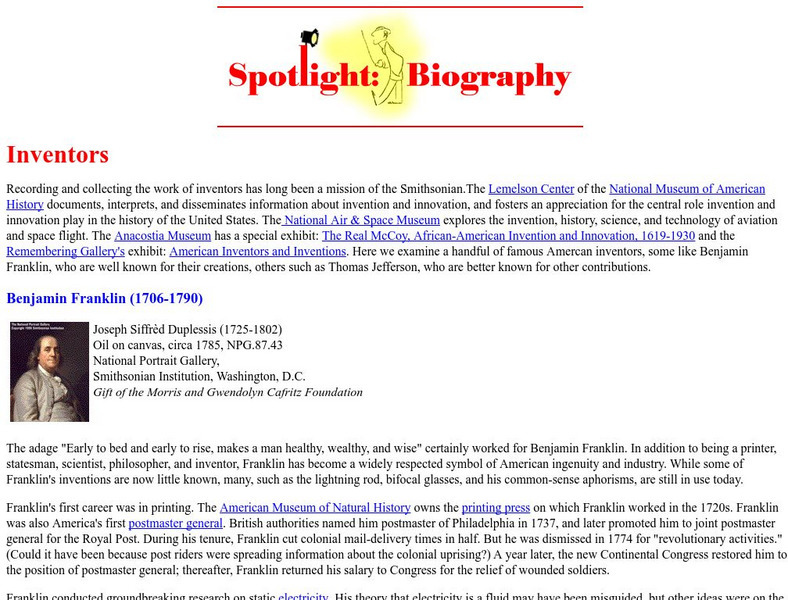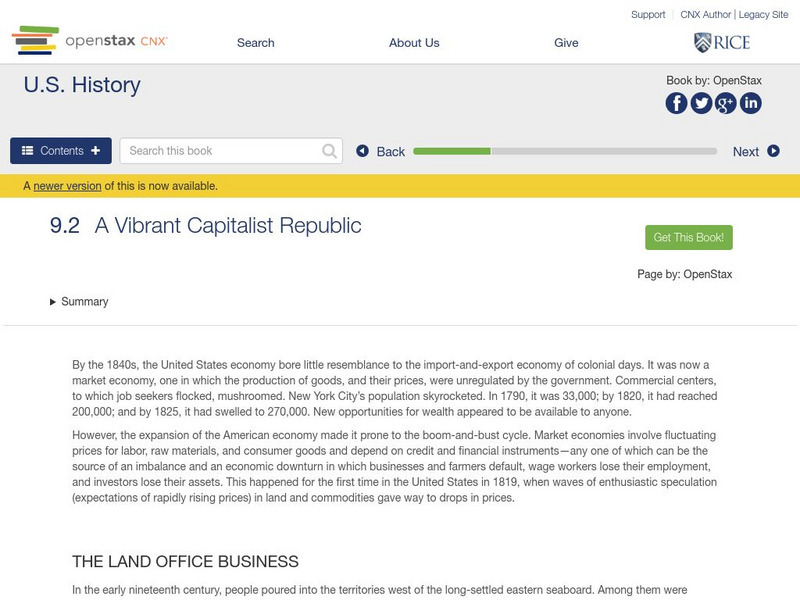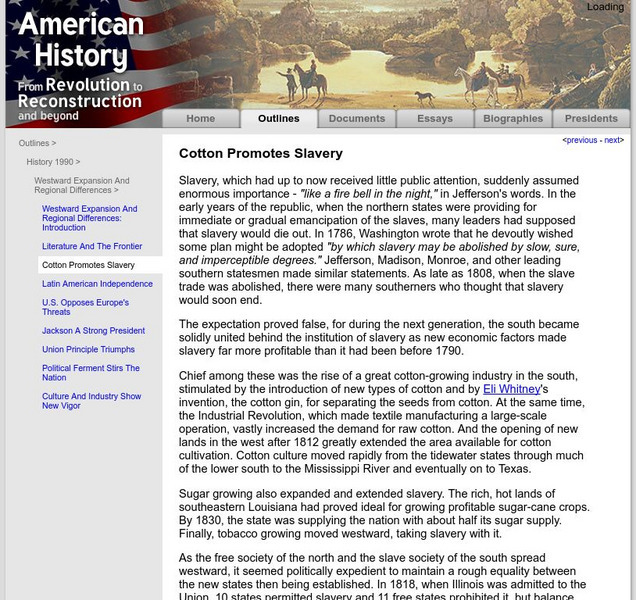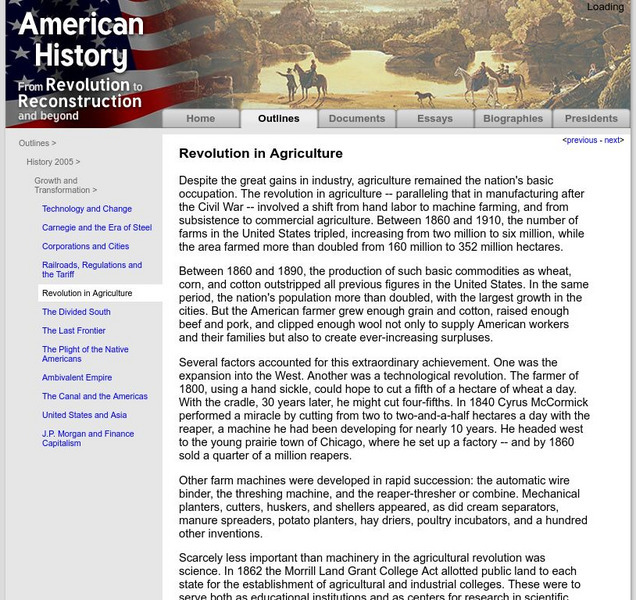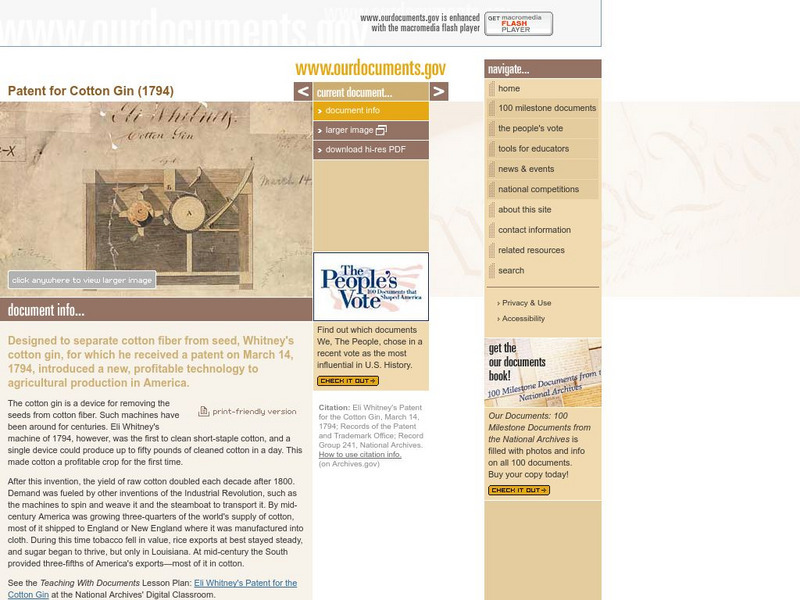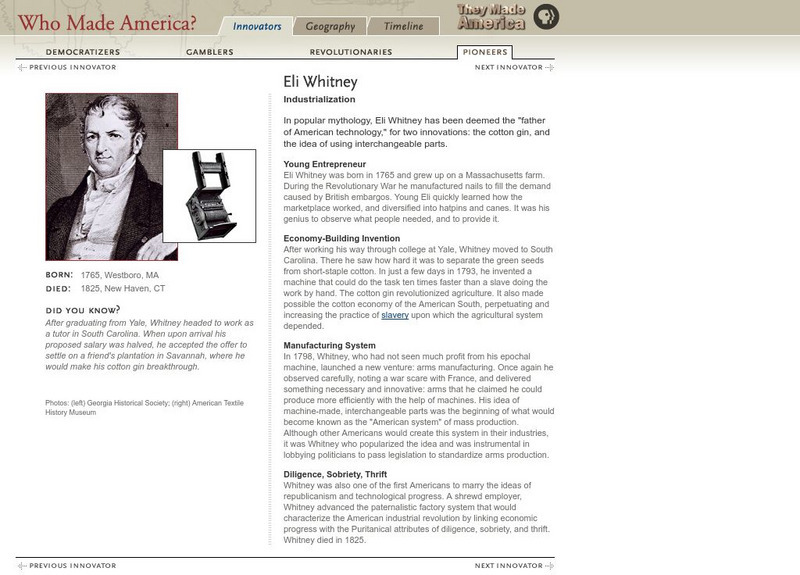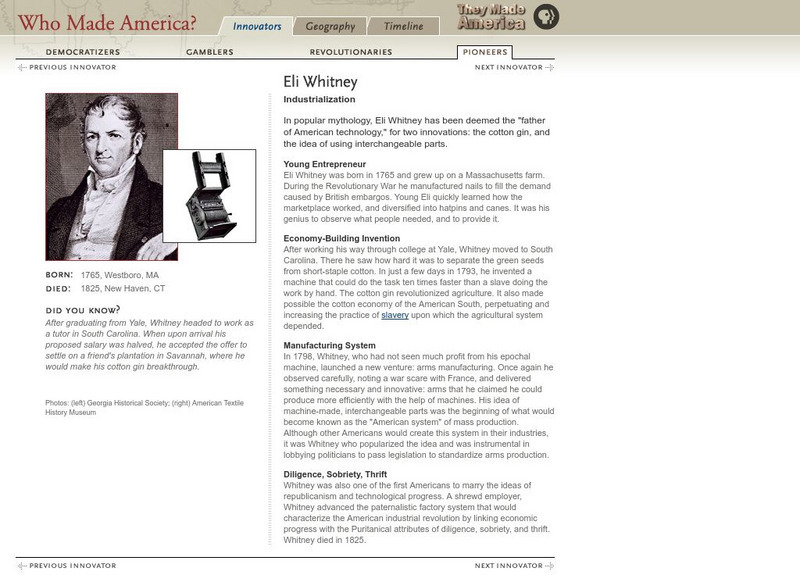DocsTeach
A Petition for the Cotton Gin
While almost forgotten today, the cotton gin could be seen as one of the causes of the Civil War. The innovation led to more cotton production, which in turn undermined political power balances in the 1800s. Individuals unpack the...
MCHS Early US History
Ken Burn’s Civil War, Episode 1: The Cause
Ken Burn's epic documentary miniseries The Civil War, broadcast in 1990, was the most-watched PBS program ever. A question sheet helps viewers keep track of events in the first episode of the documentary.
Curated OER
The Cotton Gin
High schoolers are introduced to an early American inventor, Eli Whitney, and his experiences with the Patent Office. The economic importance of the cotton gin and its impact on slavery are also addressed.
Curated OER
Eli Whitney's Patent for the Cotton Gin
Students review the U.S. patent laws by researching Eli Whitney's petition for a renewal on his cotton gin patent. They examine documents to assess the impact of the cotton gin, role-play the patent hearing and discuss the effects of...
Curated OER
The Impact of the Cotton Gin
Fourth graders study Eli Whitney and the cotton gin. In this lesson on the cotton gin, 4th graders use primary and secondary sources to gather information about Eli Whitney, the cotton gin that he invented and how it changed the south.
Curated OER
Thoreau
Eleventh graders answer the question Why Westborough? Why did their town develop as it did, what types of industry were here and why. They are introduced to journal writing. Students free write about ideas that stand out from class. ...
Curated OER
Cotton Production and Milling
Students examine cotton production and milling. They compete in a hand-ginning contest to realize how difficult it was to separate the seeds from the fibers of cotton. They discuss why Eli Whitney's cotton gin was an important invention.
Digital History
Digital History: Pre Civil War South
A comprehensive look at the economy of the South and the changes brought by the cotton gin. Read through five pages that discuss the economy, the tradition of the plantation, and the sectionalism that arises in this time period.
Smithsonian Institution
Smithsonian Education: Spotlight Biography Inventors
This site provides information on American inventors Benjamin Franklin, Robert Fulton, Eli Whitney, Thomas Jefferson, Isaac Singer, Wilbur Wright, Thomas Alva Edison, Elias Howe, and Alexander Graham Bell. It offers pictures from and...
Other
Eli Whitney Museum: Eli Whitney
This is the Eli Whitney Museum online. Provides information on the inventor, his product, his factory, and much more. Also provides information on the museum itself. Flashpoint not needed, but recommended.
OpenStax
Open Stax: A Vibrant Capitalist Republic
By reading this section of a chapter on "Industrial Transformation in the North," students will be able to explain the process of selling western land, discuss the causes of the Panic of 1819, and identify key American innovators and...
A&E Television
History.com: Black History Milestones
A detailed account of the history of African Americans is presented in this article. Divided by main topics or periods of time, the coming of slavery to America is the first focus. Followed by plantation life and escapes to freedom and...
PBS
Wnet: Thirteen: Freedom: A History of Us: Wake Up, America!
This resource covers the changing of America due to the Industrial Revolution which brought in not only new technology but also opened the door to reform movements. From the series by Joy Hakim, "A History of Us." Includes a teacher's...
National Inventors Hall of Fame
National Inventors Hall of Fame: Eli Whitney: Cotton Gin
Read about Eli Whitney's cotton gin and its importance to the cotton industry.
Ohio State University
Osu History Teaching Institute: The Cotton Gin
This lesson will help students understand the importance of the invention of the cotton gin by Eli Whitney in 1794.
Cornell University
Cornell University: Library: I Will Be Heard: A Slave's Life
A brief look at how slavery in America was tied to the crops grown in the South. See how the need for skilled workers was decreased and the use of unskilled slaves increased with the introduction of the cotton gin.
Houghton Mifflin Harcourt
Harcourt: Biographies: Eli Whitney
This is a great resource for Eli Whitney. Details his development of the cotton gin, and offers additional information through outside links.
University of Groningen
American History: Outlines: Cotton Promotes Slavery
A brief history of how the economic growth of the South became dependent on the work of slaves and how this solidified the unity of the southern states. Links throughout the text will take to you sites containing relevant information.
Digital History
Digital History: The Industrial Revolution [Pdf]
This site covers both the initial Industrial Revolution in the United States in the late 18th and early 19th centuries and the second revolution that highlighted new inventions and the businessmen who financed industry. Read brief...
University of Groningen
American History: Outlines: Revolution in Agriculture
Article outlining the extraordinary achievements in agriculture during the 1800s.
Georgia Humanities Council and the University of Georgia Press.
New Georgia Encyclopedia: History and Archaeology: Eli Whitney in Georgia
Although Eli Whitney was born in Massachusetts, it was in Georgia that he invented the cotton gin in 1793.
US National Archives
Our Documents: Patent for Cotton Gin (1794)
Interactive image of Eli Whitney's plans for the cotton gin, accompanied by an explanation of the cotton gin's purpose and significance in relation to the Industrial Revolution.
PBS
Pbs: Who Made America?: Innovators: Eli Whitney
One-page profile of influential innovator, Eli Whitney, whose vision and ideas created the cotton gin and what would later be known as "mass production".
PBS
Pbs Who Made America? Eli Whitney
In popular mythology, Eli Whitney has been deemed the "father of American technology," for two innovations: the cotton gin, and the idea of using interchangeable parts.








